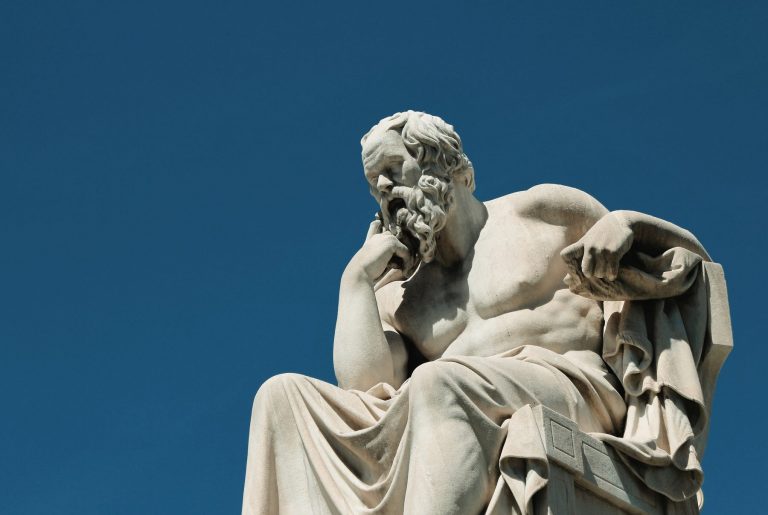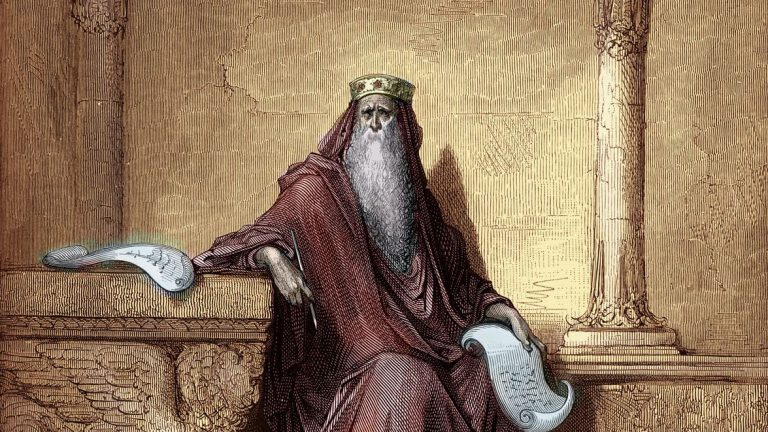In his Apology, Plato talks about Chaerephon, a friend of Socrates consulting the oracle of Delphi to know if there is anyone wiser than Socrates in Athens. The oracle tells him that Socrates is the wisest person in Athens.
Chaerephon informs Socrates about this affirmation by the oracle. Even though Socrates does not disbelieve the oracle (because gods do not lie), he was rather perplexed by the oracle’s affirmation because he believed that he was very deficient both in knowledge and wisdom. At the same time, he also knew many people in Athens who were known both for their knowledge and wisdom. Determined to get all his doubts regarding the matter cleared, Socrates began interviewing the Athenian known to be knowledgeable and wise. In the process, he was amused to learn that every one of them either knew very little or nothing of what they claimed to know. None of them was as wise as they presented themselves to be. At the end of his investigation, Socrates came to conclude that the oracle was right because everyone was deficient in knowledge and wisdom even though they claimed to be sufficient in both. On the other hand, Socrates knew and accepted that he was deficient in both, and hence, as per the oracle, had some claim to be regarded as the wisest person in Athens.

In Act V Scene 2 of Shakespeare’s As You Like It, Touchstone, the fool and court jester of Duke Frederick, asks William, “Art thou wise?” to which William responds saying, “Ay, sir, I have a pretty wit.” Touchstone is prompt in deflating William’s pomposity with the retort, “I do now remember a saying, ‘The fool doth think he is wise, but the wise man knows himself to be a fool.’” Touchstone is intelligent enough to understand what constitutes wisdom. According to Lao Tzu, the ancient Chinese philosopher, “knowing others is intelligence; knowing yourself is true wisdom.” Aristotle, the ancient Greek philosopher affirms Lao Tzu when he says, “knowing yourself is the beginning of all wisdom.”
According to the Book of Proverbs, in the Bible, “Wisdom reposes in the heart of the discerning” (4:33). Perhaps, it is this ability to discern that made Socrates different from his contemporaries in Athens. The dictionary meanings of the word, ‘discern,’ being ‘to sift,’ ‘to distinguish,’ ‘to separate,’ ‘to figure out,’ and ‘to make the right choice,’ we can define discernment as the process of distinguishing right from wrong, truth from falsehood, and good from evil.
The proverbial act of the swan separating milk from water (in the Hindu mythological tradition) is a perfect metaphor of discernment as a process of distinguishing right from wrong, truth from falsehood, and good from evil. This unique ability is attributed to the swan on account of its special feeding habit. Essentially, the swan is an herbivorous bird that is fond of eating the stems and roots of aquatic vegetation. Therefore, while trying to feed on this vegetation from water bodies, it dips its head underwater. By means of the lamellae (filters) in its mouth, it is able to sift very dexterously the food from the dirt before swallowing. Probably, because of this special sifting ability, the Yajur Veda refers to the swan’s proverbial ability to separate soma from water. (Soma is a fermented drink depicted in Vedic scriptures that is consumed by the Hindu gods and their ancient priests, during religious rituals. It is regarded as the elixir for all ailments as well as the source of wealth).
Owing to its esoteric ability, the swan has become the symbol of discretion, knowledge, and wisdom. Regarded as an epitome of purity, the amazingly beautiful and graceful white swan is also a symbol of spirituality and an object of admiration and veneration. What could Saraswati, the Hindu goddess of learning, knowledge, and wisdom, choose as her vehicle other than the swan?
Emerging from the mouth of Brahma, the fabulously beautiful female deity, Saraswati, inspired Brahma to undertake the act of creation out of the endless indistinct chaos. As per the Hindu tradition, Brahma undertook the task of creation with Saraswati as his source of wisdom. Striking a noteworthy parallel with the Hindu tradition, the Book of Proverbs personifies the boundless wisdom of God as a woman. She represents the creative dimension of God, and it is “by wisdom, the Lord laid the earth’s foundations” (3:19). Serving God as His handmade, she assists God in His work of creation (8:22-31).

With her knowledge and wisdom, Saraswati helps Brahma to sustain the universe, and establish dharma (the religious moral code of conduct that guarantees society’s stability and wellbeing). With directives loud and clear, one meets the personified Wisdom of the Book of Proverbs everywhere — in the squares, the noisy streets, at the entrance of the city gates (1:20–21), on the highest point along the way on the crossroads, at the city gates, at the entrance of the doors (8:2–3) and at the highest point of the city (9:3). She offers her priceless assistance to all who seek her. She protects, watches over, and imparts knowledge and understanding to those who seek her (4:6-7).
When Shiva noticed that the world was simmering with wickedness, he sent out the fire of his divine fury to destroy it. Immediately, the compassionate Saraswati (the wisdom of Brahma) transformed herself into a river that absorbed the dreaded all-destroying fire and saved the world. It is in this context that we should pay heed to the advice in the Book of Proverbs: “Do not forsake wisdom, and she will protect you; love her, and she will watch over you” (4:6). If one has to have Wisdom on one’s side as a protector, caregiver and saviour, one must have the kind of discerning heart that King Solomon prayed to God for.
In 1 Kings 3:9-12 in the Bible, God appeared to King Solomon during the night in a dream and said, “Ask for whatever you want me to give you.” Solomon prayed for a wise and discerning heart saying, “So give your servant a discerning heart to govern your people and to distinguish between right and wrong. For who is able to govern this great people of yours?” God was pleased that Solomon asked for a discerning heart and wisdom. So, God said to him, “Since you have asked for this and not for long life or wealth for yourself, nor have asked for the death of your enemies but for discernment in administering justice, I will do what you have asked. I will give you a wise and discerning heart, so that there will never have been anyone like you, nor will there ever be.” A discerning heart is the seat of wisdom and the beginning of many blessings in life.
Emerging from the mouth of Brahma, the fabulously beautiful female deity, Saraswati, inspired Brahma to undertake the act of creation out of the endless indistinct chaos. As per the Hindu tradition, Brahma undertook the task of creation with Saraswati as his source of wisdom. Striking a noteworthy parallel with the Hindu tradition, the Book of Proverbs personifies the boundless wisdom of God as a woman.
The notion of the discerning heart being the seat of wisdom reminds us of Psychomachia (War within the Soul), a 915-line Latin epic written by the Roman poet, Aurelius Prudentius Clemens popularly known as Prudentius in 405. As the first fully allegorical poem in Europe, it deals with the story of the battle between female personifications of Virtues and Vices for the possession of the human soul culminating in the conquest of Vices by Virtues.
In writing the poem, Purdentius banked on the biblical verses, Ephesians 6: 10-20, where St. Paul talks of the battle that every person is called to fight as a soldier of God. Wearing the armour of God, they are to fight against the machinations of the devil. Besides the verses from the book of Ephesians, Tertullian’s De Spectaculis (On the Spectacles) XXIX, Cyprian’s De Mortalitate (On Mortality) IV, and Ambrose’s De Cain et Abel (Of Cain and Abel) I. IV. XIII also served as inspiration for Psychomachia. All three suggest a conflict between various vices and virtues.
The poem consists of two parts. The first part (verses 1-724) depicts in seven engagements the contest between the personified Virtues and the personified Vices for the possession of the soul of the human person. The contest takes place in the background of the overarching love of the benevolent God of the universe and human person’s ability, with the grace of God, to withstand the allurement of the devil. The second part (verses 726-915) depicts the creation of a spiritual sanctuary in the soul of the human person wherein Wisdom may reside and from where she may govern human actions.
According to Prudnetius, every human soul may be compared to a fortress subject to the attack of the enemy, the devil. Patterned after the combats in Aeneid and Iliad, every personified Virtue engages in single combat with a Vice for the possession of the human soul — Faith with Idolatry, Chastity with Lust, Patience with Anger, Humility with Pride, Sobriety with Sensuality, and Reason with Avarice. Then Avarice disguises herself as Frugality and takes on Mercy, Peace takes on Battle, and Faith takes on Heresy. As Virtues emerge victorious at the end of all the combats, a temple is constructed within the human soul (which has now been cleaned thoroughly of all vices) where Wisdom and Peace can dwell.
Since a discerning heart alone is worthy of becoming the abode of Wisdom, I pray to the goddess of knowledge and wisdom, with the words of the psalmist: “Teach me good discernment and knowledge” (Ps. 119: 66).
Images courtesy: Pinterest, Wikimedia Commons, Learnreligions
Sacaria Joseph is an Assistant Professor in the Department of English at St. Xavier’s College, Kolkata. Having pursued his undergraduate studies at St. Xavier’s College, he furthered his academic journey by obtaining a Master of Arts degree in English Literature from Pune University, a Master of Philosophy from Jadavpur University, Kolkata, and a PhD from Visva-Bharati University, West Bengal. In addition to his academic pursuits, he writes on a wide array of subjects encompassing literature, philosophy, religion, culture, cinema, politics, and the environment.









One Response
Thoroughly enjoyed the Graeco-Roman, Biblical, and Shakesperean allusions/ parallels. A wonderful read.